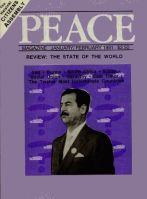
Peace Magazine Jan-Feb 1991, page 24. Some rights reserved.
Search for other articles by Sarah Genaite here
Soviet President Mikhail Gorbachev won the 1990 Nobel Peace Prize for his leading role in the international peace process. The greater openness he has brought about in Soviet Society has also helped promote international trust. He is the first Communist and the first European politician in power to receive a Nobel Peace Prize. Gorbachev was awarded primarily for his international policies, for making the world a safer place to live. His policies also have had a profound liberating influence on this own country, but things are not going very smoothly now.
The economic situation is getting worse and nationalist conflicts and ethnic intolerance are growing. The Soviet people are tired of these hardships and of the struggle between the political centre and the republics, between the republics and regions.
To demolish the huge country -which was monolithic only a year ago - seems easier than to build a new historic entity that would unite the Soviet people. Already, 14 of the 15 Soviet republics have declared "sovereignty" and decided that their local constitution takes precedence over the Soviet constitution. Four republics have declared their independence and secession from the Soviet Union. The regions within the republics keep tuming away from their centre, the cities and districts from the regions. Lecal national-ism has turned itself not only against the centre but also against internal minorities-even those who have lived there for centuries in a peaceful coexistence.
The Soviet government has sent troops to a tense area of Moldova where ethnic Turks, known as Gagawz, and ethnic Russians, so called migrants, have proclaimed their independence from Moldova. Both ethnic minorities have complained of discrimination by the Moldovans. South Ossettia, officially an autonomous region under Georgian jurisdiction, has declared itself to be an independent republic, in order to protect its cultural identity. In Estonia a small region inhabited by the Russians also declared itself to be an autonomous region. Mass exodus is hindering Soviet Central Asia. last year the number of indigenous inhabitants who left Uzbekistan reached 94,000. According to preliminary estimates, this year the number of immigrants from Central Asia will be greater than 200,000. Most of these people are being driven away from there by uncertainty about the future and by fear, intensified by the violent events in Ferghana and Osh. Unable to ascertain the real intentions of the new parties and movements, they fear that power may be taken by those whose motto is "Turkestan for Turks."
There are still tensions between Azerbaijan and Armenia. Gorbachev's Nobel prize is covered not only with laurel but also with thorns of the reality of life. The word "peace" in the Soviet Union is more often applied to the foreign world than to the situation in their country. Gorbachev's policy inside the country does not enjoy firm support among the people, and this weakens his role as peacemaker.
Despite the gloomy reality, the situation in the Soviet Union is not doomed. The possibility of surviving in a new form of integrity is not yet lost. Gorbachev stands against separatism and proposes a new Union Treaty-a looser federation. His design for reorganizing the Soviet Union from top to bottom is meeting resistance from the bottom up; it is opposed by Russia, the Ukraine and some other republics and regions. The conflicts and confrontations between the government of the USSR and the government of Russia are sharply intensifying the general crisis of the Soviet society. But on the other hand, many of the newly elected non-communist leaders in the republics have already been convinced that there is no way to break the ties with the Soviet Union. Isolation cannot be a reasonable policy and the West is not going to embrace them with unconditional political and financial support.
Gorbachev's challenge is to establish trust between the political centre and local authorities by consolidating all democratic factions in the parliaments and by seeking compromise. The world and the Soviet people are hoping that he, the darling of the West and the winner of the Nobel peace prize, will avert the tragedy of a civil war and to bring the cold war in his country to an end,just as he did with the Cold War of foreign policy.
Sarah Genaite teaches in the Division of Social Sciences at York University.

Peace Magazine Jan-Feb 1991, page 24. Some rights reserved.
Search for other articles by Sarah Genaite here